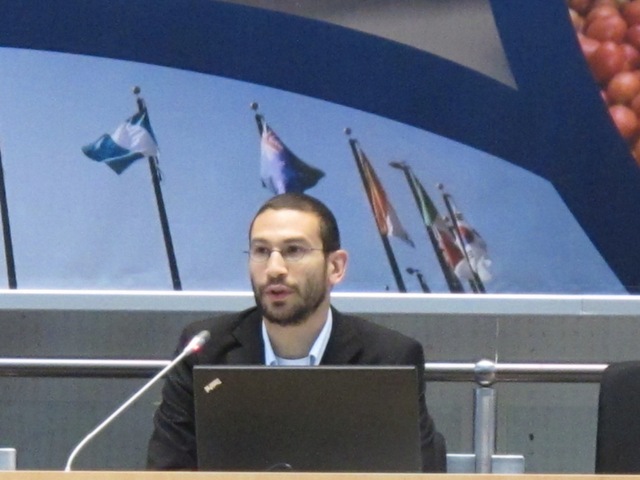It’s finally day one of the IPBES plenary where delegates from more than 100 countries are meeting to discuss how governments, scientists and “others” (many others) interact to jointly resolve Earth’s environmental problems.
After a pleasantly surprising short opening, everyone delves into dealing with texts. Lots of texts (“words, words, words” as Hamlet might say).
 |
|
Guy Pe'er, a member of SCB's IPBES delegation, at an IPBES meeting in Bonn, Germany |
|
|
I sit behind the empty seats of Samoa and the Syrian Arab Republic and later move to an even better spot behind the empty seats of Poland and Qatar. From here I watch discussions about every detail of section “one-slash-one-slash-two-INF-3-a“ (etc.) slowly form the structure and procedures of a body which could reshape the way governments throughout the world respond to the biodiversity crisis and its implications on nature and our future.
Obviously the delicate discussions are pulled and pushed between those who are generally more in favor or more careful, those who recognize the critical role of scientists versus who those who are more concerned about the rights and roles of indigenous people and their knowledge.
|
More Highlights from Day 1
Today, the plenary was opened, Bureau members were elected, and we proceeded to discuss Rules of Procedure for the Plenary and the work program of IPBES.
SCB was invited to participate in a panel at a lunchtime capacity building session hosted by UNDP, which highlighted many of the roles that we as members of SCB can provide to facilitate the work of IPBES. In this case, capacity building is not just financing and training, but includes making knowledge accessible.
We noted many roles that SCB already provides to increase accessibility of knowledge and promote the development of networks so the communication of knowledge is facilitated.
Examples include subsidizing journal subscriptions, registration and travel to SCB conferences for students and developing country members; hosting training courses; commissioning special journal issues on key or emerging topics, and hosting working groups and ‘Think Tanks’ to summarise and advance knowledge; and making information and links available on the SCB website such as the Membership Expertise database that allows identification of experts on topics or in geographic regions.
- Carolyn Lundquist
|
It is fairly obvious that the plenary discussions are merely the superficial reflection of much bigger currents of corridor-discussion, where “stakeholders” (that is, the broad form of “we”) actually interact with one another and with governmental representatives.
No point of going into any details, instead I prefer to focus on one comment today which I found particularly thought-invoking.
Japan made a remark – which might have passed rather unnoticed – on the question of how to deal with natural disasters. Quite understandable. Now, let’s think what this comment implies on the structure and “rules of procedure” of IPBES.
First, we are talking about a “local” (national) disaster. Is this global enough to warrant a response by IPBES? Obviously, it’s a reflection of a global phenomenon where human populations increase, infrastructures are pushed to more and more risky locations, and consequently natural disasters affect us more strongly. In this case the disaster was not induced by climate change, but recall of course that in many cases such disasters relate to extreme weather events, and are often aggravated by ecosystem collapse. In other words, local or national case-studies are nothing else but manifestations of the global crisis.
Second, natural disasters necessitate quick decisions and action: Do we want to assess the causes and impacts of this or that event? If so, the deciding body must be able to act here and now. This affects the “rules of procedures” if the deciding body is too heavy, or depends on “the next meeting of the plenary”, it cannot respond effectively. Switzerland’s representative put it nicely: IPBES must respect the MEP (the “multidisciplinary expert panel” – who will have to decide on such issues) and give it freedom, for the value of the MEP is its scientific independence.
Finally, if IPBES wants to act rapidly in response to natural disasters, it has to quickly find the experts. Who would they contact and how? So, this global organization called IPBES will be tested in its capacity to work, effectively and quickly, with various organizations and people from local to global (in fact, mostly local). Our point is that the only way to do this is with an effective “stakeholder engagement strategy.” Here is Bolivia’s way of putting it: “We need to set-up eco-regional structures within which scientists and academics, indigenous networks and social organizations must be included.”
It was a difficult question given that the plenary couldn’t reach a consensus even on the question of the admission of observers (that’s us) to the plenary.
Blog Posts from SCB's IPBES Delegation
SCB IPBES Resources
